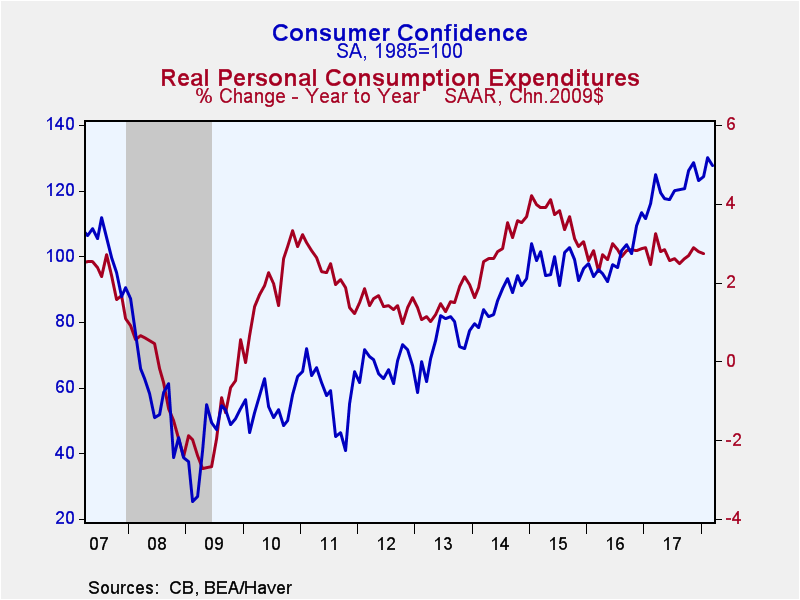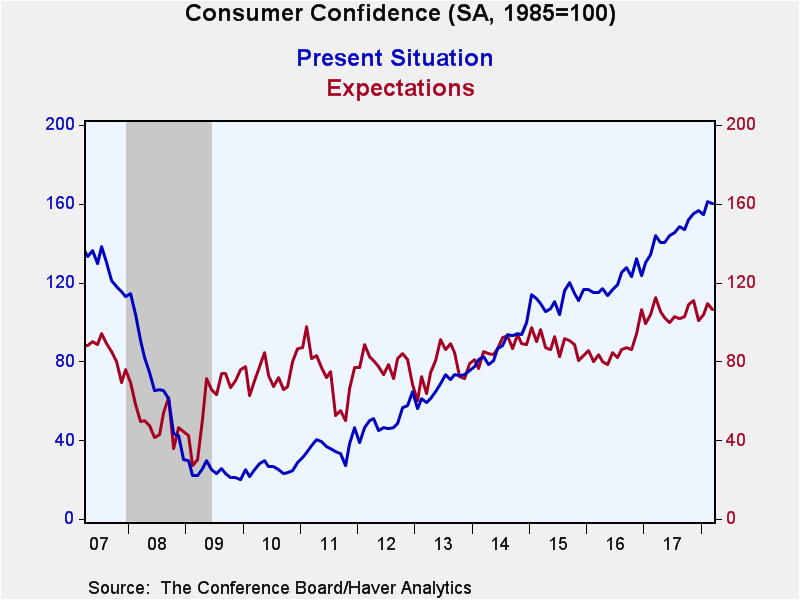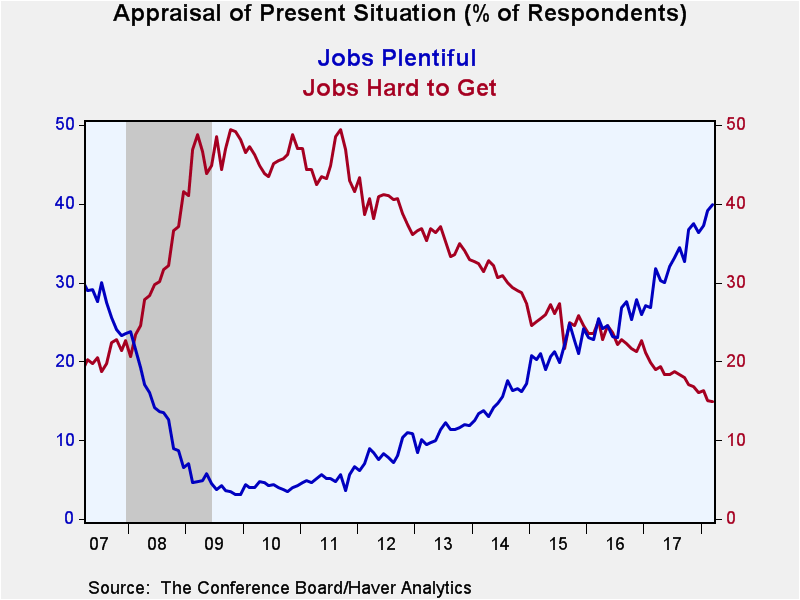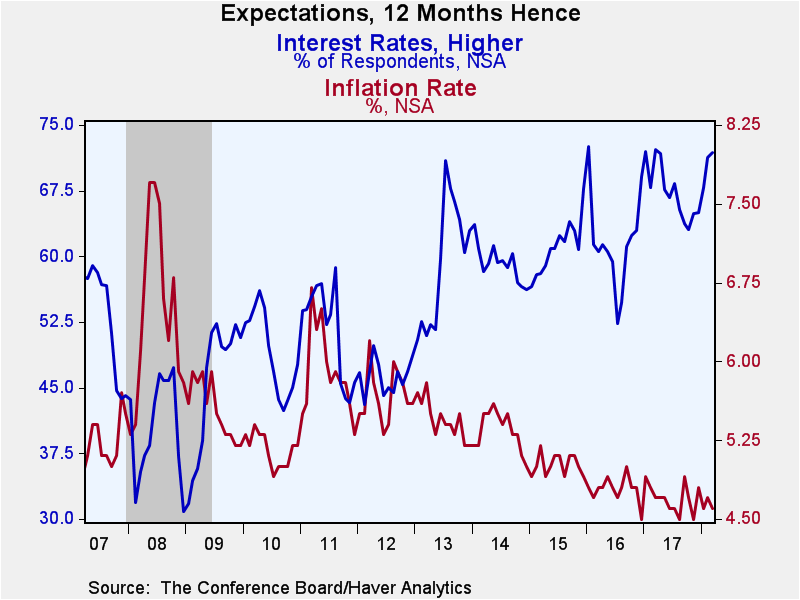 Global| Mar 27 2018
Global| Mar 27 2018U.S. Consumer Confidence Weakens
by:Tom Moeller
|in:Economy in Brief
Summary
The Conference Board Consumer Confidence Index fell 1.8% during March (+2.2% y/y) to 127.7 following a 4.6% increase during February to 130.0, revised from 130.8. A level of 131.0 had been expected in the Action Economics Forecast [...]
The Conference Board Consumer Confidence Index fell 1.8% during March (+2.2% y/y) to 127.7 following a 4.6% increase during February to 130.0, revised from 130.8. A level of 131.0 had been expected in the Action Economics Forecast Survey. The indexes are based on 1985=100. During the past 10 years, there has been a 70% correlation between the level of consumer confidence and the y/y change in real PCE.
The decline in overall confidence reflected a 2.7% fall (-5.4% y/y) in the expectations index to 106.2 after February's 5.0% rise. The present situation index reading eased 0.8% (+11.1% y/y) to 159.9 following a 4.2% increase.
The percentage of respondents indicating conditions are "good" improved to 37.9% this month, the most since December 2000. The percentage saying business conditions are "bad" also rose to 13.4%, a five-month high. Job market readings remained firm. Jobs were viewed as "plentiful" by 39.9% of respondents, the most since April 2001. Jobs were viewed as "hard to get" by 14.9%, the least since July 2001. The net jobs assessment strengthened to +24.7, the most favorable since May 2001. The differential is 97% inversely related to the unemployment rate.
The decline in the overall expectations reading reflected a fall in the percentage expecting business conditions to improve over the next six months. It eased to 23.0% from 25.0% in February, but the percentage expecting conditions to worsen remained low at 9.8%. Those expecting more jobs declined to 19.1%, down from the 23.8% expansion high reached 12 months ago. Incomes were expected to improve by a lessened 22.0% of respondents, but that remained up from the full-year 2009 low of 9.9%.
Expectations for the inflation rate in twelve months eased to 4.6% and has been fairly stable since the 4.8% low during all of 2016.The percentage expecting higher interest rates over the next twelve months increased to 71.9%, the most since March 2017 and up from the July 2016 low of 52.3%. Those looking to buy a home in the next six months declined sharply to 5.5%, the least since July 2016.
By age group, confidence decreased the most (-8.1%) amongst individuals under age 35 to the lowest level since February of last year. Confidence amongst those aged 35-54 declined 2.3% and was fairly steady y/y. Respondents over age 55 saw confidence ease slightly (+8.9% y/y) following two months of strong gain.
The Consumer Confidence data is available in Haver's CBDB database. The total indexes appear in USECON, and the market expectations are in AS1REPNA.
| Conference Board (SA, 1985=100) | Mar | Feb | Jan | Y/Y % | 2017 | 2016 | 2015 |
|---|---|---|---|---|---|---|---|
| Consumer Confidence Index | 127.7 | 130.0 | 124.3 | 2.2 | 120.5 | 99.8 | 98.0 |
| Present Situation | 159.9 | 161.2 | 154.7 | 11.1 | 144.8 | 120.3 | 111.7 |
| Expectations | 106.2 | 109.2 | 104.0 | -5.4 | 104.3 | 86.1 | 88.8 |
| Consumer Confidence By Age Group | |||||||
| Under 35 Years | 125.3 | 136.3 | 128.3 | -7.7 | 130.2 | 122.4 | 116.0 |
| Aged 35-54 Years | 130.2 | 133.2 | 127.3 | 0.2 | 123.5 | 106.2 | 103.9 |
| Over 55 Years | 125.7 | 125.9 | 119.0 | 8.9 | 112.9 | 84.6 | 84.1 |
Tom Moeller
AuthorMore in Author Profile »Prior to joining Haver Analytics in 2000, Mr. Moeller worked as the Economist at Chancellor Capital Management from 1985 to 1999. There, he developed comprehensive economic forecasts and interpreted economic data for equity and fixed income portfolio managers. Also at Chancellor, Mr. Moeller worked as an equity analyst and was responsible for researching and rating companies in the economically sensitive automobile and housing industries for investment in Chancellor’s equity portfolio. Prior to joining Chancellor, Mr. Moeller was an Economist at Citibank from 1979 to 1984. He also analyzed pricing behavior in the metals industry for the Council on Wage and Price Stability in Washington, D.C. In 1999, Mr. Moeller received the award for most accurate forecast from the Forecasters' Club of New York. From 1990 to 1992 he was President of the New York Association for Business Economists. Mr. Moeller earned an M.B.A. in Finance from Fordham University, where he graduated in 1987. He holds a Bachelor of Arts in Economics from George Washington University.
More Economy in Brief
 Global| Feb 05 2026
Global| Feb 05 2026Charts of the Week: Balanced Policy, Resilient Data and AI Narratives
by:Andrew Cates










